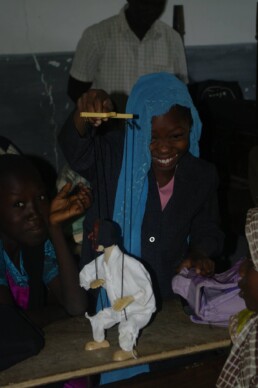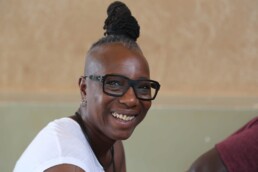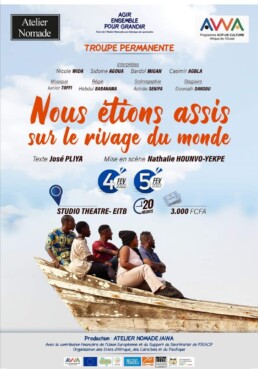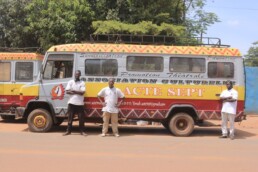Festival International de Théâtre de l'Afrique de l'Ouest - FITAO Casamance en Scène
Through its animation and awareness-raising activities in Africa, the association participates in citizen development. Since 2007, it has organised the annual international West African theatre festival "Casamance en scène", which has become a platform for training and artistic and cultural promotion.
The cancellation of the 2020 edition due to Coronavirus, followed by the introduction of a curfew, turned the organisation and running of the festival upside down. Instead of being held over a week, in 2021, the highlights were spread over several months, and the performances went beyond the walls of the Alliance Française to take over the courtyards of the houses in the Yamatogne neighbourhood. Today, the project intends to perpetuate this new formula, which has proved to be more effective in terms of promotion and distribution among the population.
"Présence Noire dans la Danse", promotion of dance arts
More than ever, École des Sables wants to maintain its educational role and offer development opportunities to young dancers from the continent. This centre of excellence offers participants local and international artistic career opportunities. However, in order to allow black dancers to reveal themselves and to blossom outside the stereotypes of the dance world, it is essential that this course be given by teachers and researchers from Africa, its diaspora and the West Indies, in a spirit of sharing, dialogue and reciprocal exchange. Moreover, the collaborations between Pan-African dancers will be the fruit of new creations offered to festivals and a touring circuit in Europe, the United States and the world.
A look at planned productions
- Access to certified training for 30 dancers from Africa and the diaspora
- creating and nurturing different work opportunities through original choreographic writing rooted in black identity
- establishing communication tools
Focus on JANT-BI- École des Sables
Founded by Germaine Acogny and Helmut Vogt in 1998, Jant-Bi - École des Sables, the International Centre for Traditional and Contemporary African Dance, aims to provide professional training for African dancers and to develop and promote contemporary African dance. It has already trained over 700 dancers from 27 African countries.
"PAPRICAI+", support for capacity building of the creative business incubator
Based on the unique concept of a tri-polar structural device (e-training, e-support and e-financing platforms), the PAPRICAI+ project aims to strengthen the pedagogical and operational capacities of the PAPRICAI incubator. Through a revitalisation of the entrepreneurial ecosystem and an improvement of the institutional framework of the creative and digital sector in Togo, this project will contribute to the improvement of creativity, professionalisation and competitiveness of artists and creators operating in the digital environment. This ambitious project will ultimately benefit project leaders, entrepreneurial support structures and innovative companies and startups in the cultural and creative sector.
A look at planned productions
- strengthening the structural capacities and competitiveness of the incubator
- boosting the competitiveness of 100 digital start-ups
- creating a community of 20 creative entrepreneurship support structures
- helping to finance 100 innovative creative start-ups
Focus on ADEC
The Agence de Développement des Entreprises Culturelles has a vision of culture as a driver for socio-economic development in developing countries. Equipped with state-of-the-art human and technological resources, it excels in cultural engineering, the promotion and development of creative innovation and entrepreneurship.
"Agir ensemble pour grandir"
The Atelier Nomade houses the École Internationale de Théâtre du Bénin as well as several performance spaces, regular venues for Beninese, Togolese, Burkinabe and Nigerian artists. In addition to the establishment of a permanent, multi-purpose troupe of some twenty talents (directors, actors, dancers, puppeteers, circus artists, etc.), the consolidation and expansion project "Agir ensemble pour grandir " includes the creation of a museum of the performing arts. By working on the synergy between 9 sub-regional theatres (6 in Benin, 1 in Togo, 1 in Niger and 1 in Burkina Faso) and the networking of their cultural content, the project intends to take advantage of the income and move towards financial autonomy, a key objective for true anchoring and sustainability.
A look at planned productions
- creation of a permanent troupe
- opening 12 small format residences and 2 large format residences
- development of a network of cultural operators from 4 neighbouring countries
- creation of a digital platform and an online ticketing service with payment of tickets by telephone
- regular animation of the three stages of the Atelier Nomade
- creation and monetisation of a performing arts museum
Focus on Atelier Nomade
Atelier Nomade opened its doors in 1992. It is now home to the École Internationale de Théâtre du Bénin, a higher education institution that prepares students for a state diploma. The two pillars of its mission are professional training and artistic creation, which enable the cultural and artistic education of young people and local communities. The theatre school often works on themes that contribute to human development and good citizenship.
"Maremusica", production and distribution of music from Cape Verde
Highly impacted by the Covid-19 pandemic, the Cape Verdean cultural industry, and even more so its independent music industry, is in danger of disappearing. To save this popular heritage, Maremusica proposes to revive traditional music in Cape Verde by relocating the entire production chain to the archipelago. From identifying new talent to the creation of labels, including the opening of recording studios and the organisation of tours, this project involves the creation of around a hundred jobs (musicians, technicians, communication, digital, etc.) and guarantees the safeguarding and revival of the popular treasure that is Cape Verdean music.
A look at planned productions
- Production of 3 albums: an established artist in the Cape Verdean musical tradition; and two young talents, male and female
- Production of a major work of traditional Cape Verdean music (Mornas) with the Symphony Orchestra of the Calouste Gulbenkian Foundation, from Portugal
- Creation of digital platforms and uploading and monetising online content
- Creating jobs in the sector and ensuring income for artists and their families
- Attracting new investors
Focus on Maremusica, Produção, edição e distribuição musical
Founded in 2016 by musician and writer Mario Lucio, former Cape Verdean Minister of Culture, Maremusica's main objective is the creative and financial independence of Cape Verdean artists, the protection of traditional music and the discovery of new talent.
"La NEUF", training, creation and production
The Malian cultural industry offers a plethora of stakeholders but is cruelly lacking in scriptwriters, costume designers and other entertainment professionals without whom works cannot exist. In response to this shortage, "La NEUF" (Nouvelle École Usine et de Formation) offers a system of training, both face-to-face and at a distance, including workshops, masterclasses and internships for dialogue with professionals. This proposal for training in the performing arts will ultimately lead to the creation of new shows to be presented during a tour of 8 cities, already established by the association. Acte SEPT also intends to involve communities in order to establish a sustainable and culturally endogenous funding mechanism, a factor in sustainable development.
A look at planned productions
- Creation of a digital platform for training
- Establishment of 16 workshops on the performing arts professions
- Creation of 8 plays
- Distribution of the 8 plays in the 8 cities of the Sirabo network
- Creation of a partner network
- Organisation of a festival
Focus on Acte SEPT
According to Acte SEPT, the project leader, "everyone must be able to participate in the cultural life of their choice and exercise their own cultural practices within the limits imposed by respect for human rights and fundamental freedoms. " Driven by this vision, the association has been working in Bamako since 1994 and has been moving to the rhythm of its Festival du Théâtre des Réalités since 1996.
"De l'Homme vers l'Homme", contemporary dance
Specialised in the field of contemporary dance, the Don Sen Folo association anchors its project in the transmission and dialogue between ancient traditions and contemporary gestures. Its distribution in public spaces increases the visibility of the artists' work among the public and local authorities, and is also a good way of getting around the difficulties of distribution in traditional infrastructures, the networks for which are often lacking in this region. In order to improve the production of African dancers and choreographers and to promote this art form at national and continental level, "De l'Homme vers l'Homme" will focus on strengthening artistic skills, activating South-South cooperation, and setting up an African network for contemporary dance in public spaces.
A look at planned productions
- Training of 14 young artists in dance and choreography
- Choreographic residencies in public spaces (2 months) involving 32 artists
- Presentation of the artists and their work in the online catalogues of the residencies and on the Numéridanse TV website
- Production, recording and broadcasting of contemporary choreographic works in public spaces
- Production of a "Guide to good practice in contemporary dance in public spaces in Mali".
Focus on Don Sen Folo
The Don Sen Folo association has been working since 2010 on the issue of access to culture, formerly in the Kalaban Coro district of Bamako and currently in the rural commune of Bancoumana. With the firm belief that Art and Culture can become the economic engines of tomorrow's society, the association works to make the work of artists known and understood by the population.
Togo Art Connection
Arterial Network Togo is a dynamic network of committed artists, cultural activists, associations and cultural and creative institutions. Its mission: to promote and defend cultural diversity through an organisational framework of national operators and stakeholders from all sectors of the arts and culture.
By bringing together international and local stakeholders in the performing arts for the first time via a (physical and digital) platform for networking stakeholders in the performing arts sector, the Togo Art Connection project aims to strengthen the production of quality artistic creations in Togo, to further engage local audiences in a dialogue with the performing arts and to grant more economic and structural independence to the Togolese cultural scene.
SOMETHING by Something We Africans Got
April27 is an independent publishing company and arts management consultancy that promotes and supports African art, culture, education and excellence through the SOMETHING WE AFRICANS GOT review and the magazine SWAG high profiles.
After 5 years of existence, 14 issues of the review and 7 of its magazine version, "Something We Africans Got" has become an alternative space, a space for exhibitions dedicated to the moving image, to the rediscovery of African cinema, to dialogue and the development of critical thinking. This project materialises the continuation of the exploration of the Arts of Africa and the Black World and the cultural links between the different countries of the continent and the rest of the world.
Basketteuses de Bamako
The NAMA Company keeps ancestral traditions alive, ensuring the survival of the art of puppetry and offering young people the opportunity to work in the cultural sector. Among its training courses, some are specifically aimed at women, a first in Mali where the art of puppetry was traditionally reserved for men.
The "Basketteuses de Bamako" project seeks to increase the number of women artists in Mali and to develop their contemporary artistic capacities through professional training, awareness-raising and mediation with the public. The project aims to offer a new mixed and popular artistic practice, an art that restores the traditional know-how of Malian women by innovating it through the practice of juggling.







